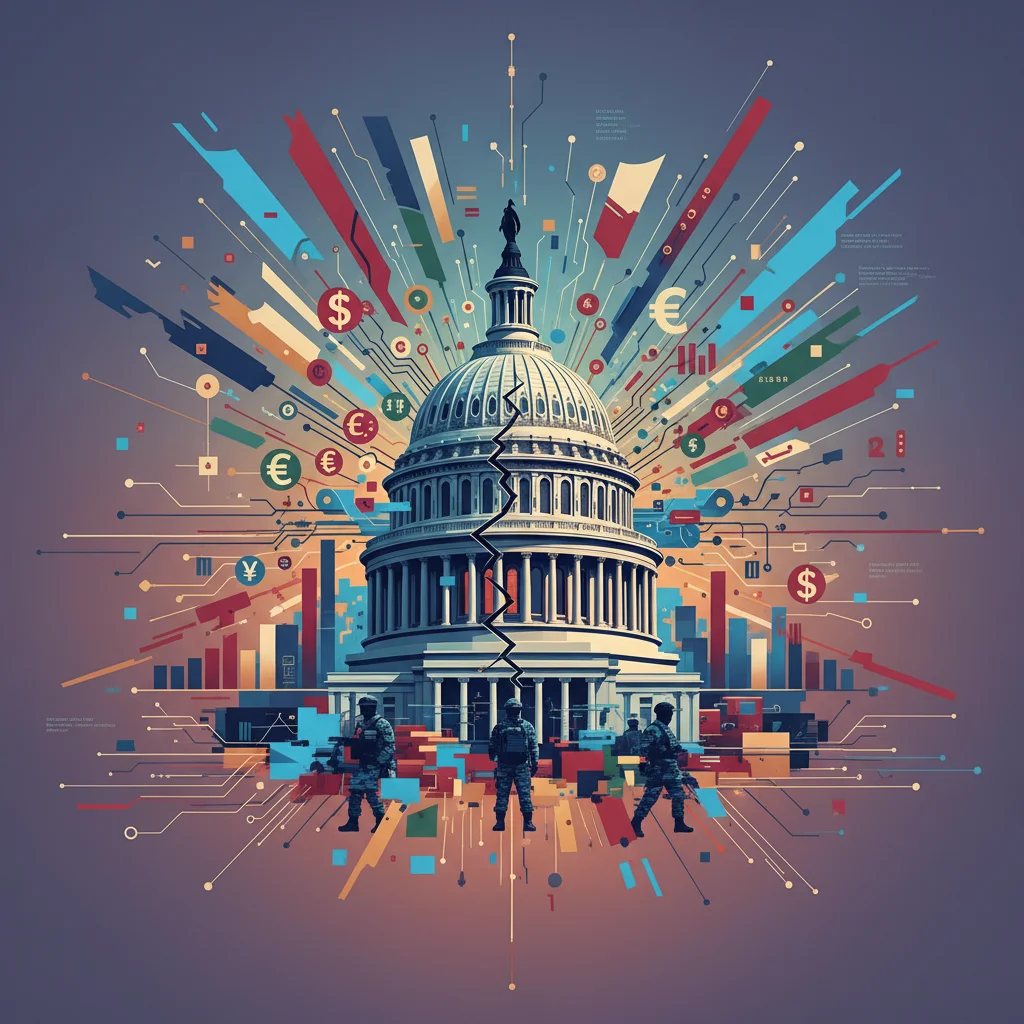
Beyond the Headlines: Decoding the Economic Ripple Effects of a Washington Crisis
In the heart of the nation’s capital, an event unfolds that, on its surface, is a story of tragedy and law enforcement. A suspect is in custody, and two members of the National Guard are in critical condition following a shooting. The initial reports, including a statement from former President Trump identifying the suspect’s national origin, paint a picture of a localized, albeit serious, security incident. For many, the story ends there—a somber headline in a rapid-fire news cycle.
However, for investors, finance professionals, and business leaders, this is merely the opening chapter. Events like these are never isolated. They are tremors that signal deeper shifts in our political, social, and economic landscape. To dismiss them as mere “news” is to ignore the potent, often hidden, variables that can influence the stock market, redefine investment strategies, and reshape the global economy. This incident, while tragic, serves as a critical case study in the interconnectedness of geopolitical instability, domestic security, and financial market behavior. Understanding these ripple effects is no longer an academic exercise; it is a fundamental requirement for navigating the complexities of modern investing and corporate strategy.
The Geopolitical Echo Chamber: From Foreign Policy to Domestic Volatility
The reported link between the suspect and Afghanistan is a stark reminder that foreign policy decisions have long, unpredictable tails. The withdrawal of U.S. forces from Afghanistan in 2021 was a seismic event, the full consequences of which are still unfolding. According to a report from the Council on Foreign Relations, the conflict cost over $2 trillion and resulted in a volatile power vacuum. While the immediate focus was on the humanitarian crisis, the long-term fallout includes unresolved security threats and displaced populations—factors that can manifest unexpectedly on domestic soil.
For the financial world, this “echo” is a form of geopolitical risk—a variable that is notoriously difficult to price into traditional models. How does an investor quantify the long-term risk of instability stemming from a two-decade-long conflict? The answer is complex. Geopolitical risk creates uncertainty, and markets abhor uncertainty. It can lead to:
- Increased Market Volatility: Sudden security events can trigger knee-jerk reactions in trading, causing sharp, albeit often temporary, dips in major indices as investors flee to safe-haven assets like gold or U.S. Treasury bonds.
- Supply Chain Disruptions: Instability in one region can have cascading effects on global supply chains, impacting everything from raw material costs to manufacturing timelines.
- Shifts in Sector Performance: Defense, cybersecurity, and private security stocks may see a surge in interest, while sectors like tourism and retail, which rely on a sense of public safety, may suffer.
The incident in Washington underscores that geopolitical risk is not a distant concept confined to emerging markets. It is a domestic reality with tangible implications for the U.S. economy and the investment portfolios that depend on its stability.
Geopolitical Chess at COP30: How Brazil's Climate Diplomacy is Reshaping Global Finance
The Rising Ledger of Domestic Security
The deployment of the National Guard in a law enforcement capacity points to another critical economic trend: the rising cost of domestic security. Every time a city or state is forced to respond to a major security threat, it incurs significant, often unbudgeted, expenses. These costs divert public finance away from other critical areas like infrastructure, education, and economic development.
Consider the economic breakdown. The costs include not only overtime for law enforcement and medical care for the injured but also the broader economic impact of disruption. Businesses may close, public transport can be shut down, and consumer confidence can wane. A study by the RAND Corporation on the economic consequences of terrorism highlights that beyond the direct costs, the indirect effects—such as heightened security measures at airports and public venues—create a permanent drag on economic efficiency.
For business leaders and investors, this trend has several implications. First, it signals a growing market for the security industry, from surveillance technology to private contracting. Second, it presents a fiscal challenge for state and local governments, potentially affecting the creditworthiness of municipal bonds. A government consistently spending on emergency response may have less capacity for long-term growth initiatives, a key factor in the world of public finance and banking.
Political Rhetoric as a Market Mover
The detail that former President Trump commented on the suspect’s origin is far from incidental. In today’s hyper-politicized and digitally connected world, political rhetoric is a powerful, and often volatile, economic variable. A single tweet or statement from a major political figure can send shockwaves through the stock market, influence consumer behavior, and alter corporate strategies.
This phenomenon has accelerated the development of fintech tools designed to scrape social media and news sources for sentiment analysis, allowing algorithmic trading platforms to react in milliseconds. The “Trump effect” on markets during his presidency is a well-documented example, where comments on trade, specific companies, or the Federal Reserve could trigger immediate market movements.
This Washington incident, and the political framing of it, feeds into larger narratives about immigration, national security, and political division. These narratives influence voter sentiment, which in turn shapes policy. Policy changes—in areas like trade, regulation, and government spending—are among the most powerful drivers of the long-term economy. Below is a table illustrating how different types of political events can translate into market impact.
| Type of Political Event | Potential Market Impact | Sectors Most Affected |
|---|---|---|
| Major Security Incident | Short-term negative sentiment, flight to safety, increased volatility. | Defense, Cybersecurity (+), Travel, Hospitality (-) |
| Controversial Executive Order | High uncertainty, potential for sector-specific disruption. | Technology, International Trade, Energy |
| Divisive Social Media Commentary | Can trigger short-term volatility in specific stocks or the broader market. | Companies mentioned directly, Social Media platforms |
| Unexpected Election Results | Significant market repricing based on anticipated policy shifts. | Healthcare, Financials, Green Energy |
For investors, this means that political analysis is no longer separate from financial analysis. Understanding the political landscape, the key players, and the narratives they champion is essential for effective risk management.
Beyond the Diamond: Decoding the Multi-Billion Dollar Economics of MLB's New Streaming Era
The Future of Risk: Integrating Non-Financial Data
How does the financial industry adapt to a world where a shooting in Washington, a conflict in the Middle East, or a tweet can have immediate financial consequences? The answer lies in the evolution of risk management and the integration of non-traditional data sources. The future of successful investing and finance will depend on the ability to synthesize disparate information into a coherent analytical framework.
This is where emerging technologies show promise. Advanced financial technology platforms are moving beyond balance sheets and P/E ratios to incorporate real-time data on everything from satellite imagery of supply chains to social media sentiment. Some forward-thinking analysts are even exploring how blockchain technology could be used to create more transparent and resilient supply chains, making them less vulnerable to the kind of geopolitical shocks that ripple through the global economy.
The goal is to build more resilient portfolios and business models that are not just insulated from risk, but are capable of adapting to it. This requires a shift in mindset—from viewing the world through a purely economic lens to adopting a multi-disciplinary approach that incorporates geopolitics, sociology, and technology.
The Billion Question: Who Audits OpenAI, and Why Does It Matter to Your Portfolio?
Conclusion: A Mandate for Broader Awareness
The tragic shooting in Washington is a human story first and foremost. But for those tasked with navigating the financial markets and leading businesses, it is also a powerful data point. It demonstrates that the neat lines we once drew between foreign policy, domestic security, and the economy have been erased.
We live in an era of complex, interconnected systems, where an event on one side of the world can impact a portfolio on the other. Ignoring these signals is no longer an option. The mandate for the modern investor and business leader is clear: cultivate a broader awareness, invest in the tools and expertise to understand non-financial risks, and build strategies that are resilient enough to withstand the shocks of an unpredictable world. The stability of our investments and the health of our economy depend on it.


